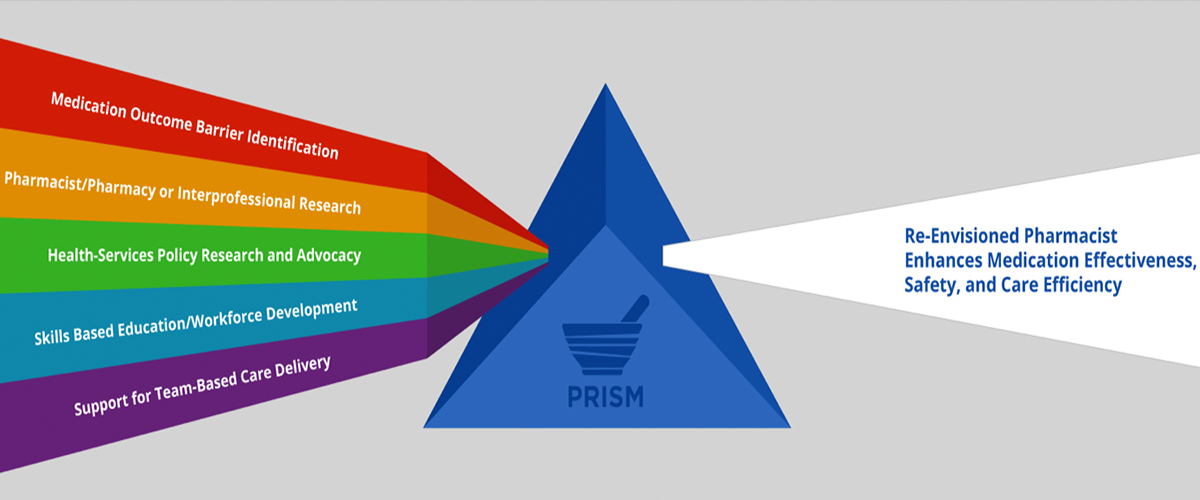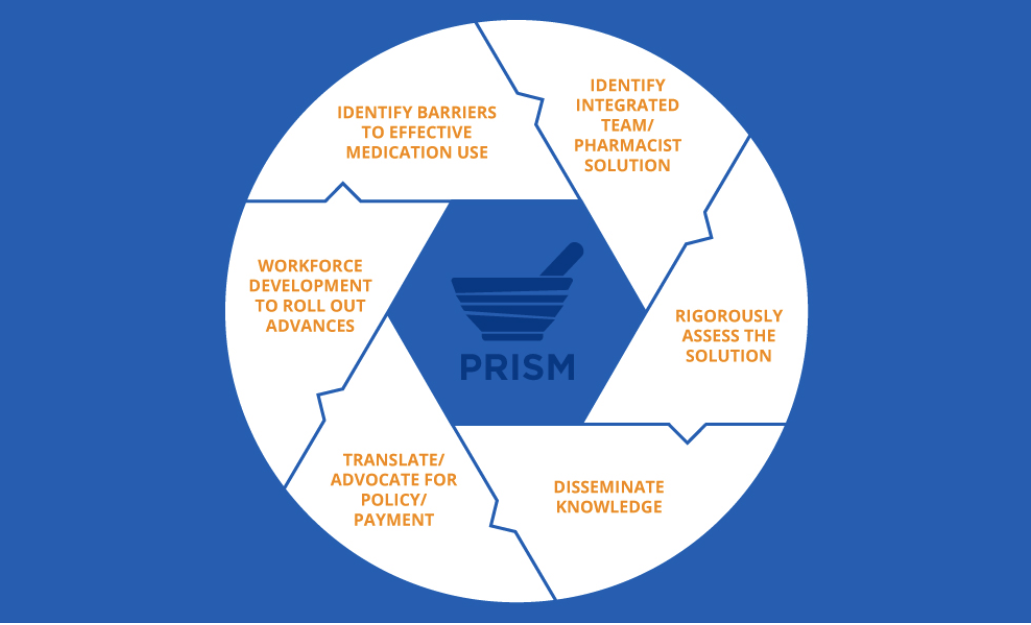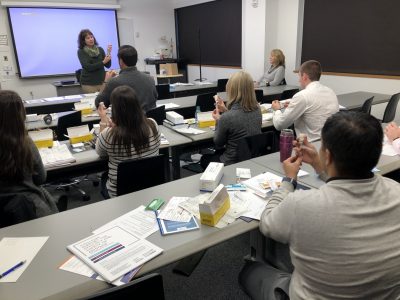
Welcome to PeRformance Improvement for Safe Medication Management's (PRISM) web page. PRISM’s mission is to improve the health of the people of the State of Connecticut, the Northeast, and beyond through safe and effective medication use that involves interdisciplinary educational programs, community-based research collaborations, health care transformation policy opportunities, and team-based care delivery.
CONTACT US
If you are a:
Provider organization, employer or payer, regulator, legislator, or health care professional interested in a speaker, panelist, consultant, or want to discuss a research project that involves new care delivery and payment models for practice transformation, contact marie.smith@uconn.edu
Pharmacy resident interested in the Palmer Fellowship in Pharmacy Practice Transformation, contact marie.smith@uconn.edu
Community pharmacist interested in partnering with us on research projects that are currently underway or ones planned for the future, contact nathaniel.rickles@uconn.edu
Community based organization interested in exploring the benefits of pharmacist-community health worker teams, contact nathaniel.rickles@uconn.edu
Researcher with an interest in evaluating the impact of pharmacist-inclusive healthcare teams in hospitals, clinics, community pharmacies, accountable care organizations, or community based organizations, contact nathaniel.rickles@uconn.edu
Pharmacist seeking pharmacist professional development so you can provide cutting edge information and services to your patients, contact jill.fitzgerald@uconn.edu
Philanthropist interested in support of Outcomes Research in the Department of Pharmacy Practice. Opportunities include: (1) faculty seed grants to enhance inter-professional collaboration, (2) research fellows that support our work, (3) mini-sabbaticals to train faculty in new techniques and methods, (4) the ability to access new datasets so our researchers can demonstrate proficiency and better compete for extramural funding, and (4) funding for research trainees to travel to present their research or for summer research traineeships. Please contact the UConn Foundation for an opportunity that speaks to your heart.
About
The Department of Pharmacy Practice at the UConn School of Pharmacy believes that PRISM is a key strategy to assure the appropriate, safe, effective use, as well as affordability, of medications. This is accomplished by focusing on skill-based training for current pharmacists and PharmD students, and integrating pharmacists with interprofessional health care teams in health systems, primary care settings, and community-based organizations. Our research has informed local, state and national health policies on care delivery transformation and payment reform.
In the pages that unfold below, you can better understand the factors that promote the creation of PRISM, the investment on behalf of the University of Connecticut to allow PRISM’s creation, our key partners who work with us to make the vision a reality, and the increasing impact we have already had on scientific discovery and the Profession of Pharmacy. PRISM transcends the walls of the School of Pharmacy and its faculty, taking place throughout the State of Connecticut and its impact is felt beyond the state borders. As you discover more about PRISM you might identify that PRISM should also include you, and we would be happy to hear from you.
Rationale – Why PRISM
US Healthcare spending exceeds $2.7 trillion dollars and makes up 18% of the Gross Domestic Product. Over 74% of office visits result in, or are a result of, medication therapy issues, but there is no routine provision of comprehensive medication optimization and management services that ensures optimal outcomes.
Medications are a cornerstone of the management of most chronic conditions. For patients with chronic diseases, various factors—such as having multiple medical conditions, seeing several providers, taking numerous medications, and having adverse reactions to drugs—can complicate the appropriate use of medications. Over 1.5 million preventable medication adverse events occur annually, 32% of medication related adverse events lead to hospital admission, and drug interactions are an important issue in medication use at home. Furthermore, only 33–50 percent of patients with chronic conditions adhere completely to the medication regimen prescribed by their health care providers. In addition, the healthcare system is being pressed to provide access to care for millions of previously uninsured or underinsured patients in a cost-effective manner. Many of these newly insured patients are also the most vulnerable.

The vulnerable are often medically complex, economically disadvantaged, ethnically diverse, and many possess language barriers. To date, not enough work has been done to target their medication-related issues and to discover effective ways to engage them in health promotion activities. While the nation as a whole has seen dramatic reductions in diseases like hypertension, myocardial infarctions, and dementia, the most vulnerable citizens do not share in the benefits. Such negative clinical outcomes also result in negative economic and humanistic outcomes. For example, the sickest patients become much more expensive because they put off care and prevention until it is too late, driving up health care costs for the entire community.
UConn’s Investment in Creating PRISM
UConn has an important public engagement role. The academic plan recognizes fully the importance of health related public engagement and emphasizes aspirations to be a “…nationally recognized leader in translational research, with special emphasis on underserved populations” and in “…promoting the health and wellness of our citizens, and eliminating the disparities and injustices that plague our society”.
PRISM aligns with two major priorities in the UConn Academic Vision – Interdisciplinary Initiatives and Health and Wellness. Consistent with these ideals and their confidence in the School of Pharmacy, the University approved the hiring of additional faculty members to join our current cadre of Pharmacy Practice faculty and provided financial resources to launch our PRISM initiatives.
For over a decade, the Department of Pharmacy Practice has been a major contributor to UConn’s public engagement activities with several faculty being recognized for their major impact to the public good. The PRISM infrastructure provides additional support to allow the Department of Pharmacy Practice to partner more closely with pharmacists, community pharmacies, community-based organizations, primary care providers, accountable care organizations, and integrated delivery systems, state agencies, and health care transformation policymakers than ever before.
PRISM Scholarship
Research does not end with FDA approval of a drug or device. High touch research is needed to translate clinical trial findings into clinical practice and the establishment of functioning health-care systems.
In order to change the way clinical care is provided and paid for, initiatives driven by research that inform that process are needed. Pharmacists are highly trained yet underutilized and they are amongst the most accessible health professionals which suggests that they are the most able to provide care to the most vulnerable patients. The ability to deliver a service at a time and place convenient to a patient with limited mobility, no sick days, and limited access to care could be a unique niche for pharmacists. In this way, we have created, and are hoping to expand, networks that can be interconnected allowing for greater reach in communities and the ability to access patients like never before. These networks will be focused on contemporary and complex challenges to the lives of those we care for.
Interconnected Networks and Clinical Areas
Interconnected Networks
Community Pharmacies
Community Based Organizations
Novel Care Delivery Models
There are many clinical areas where faculty and our partners have had an important impact.
Clinical Areas
Primary Care
Patient Communications and Understanding
Infectious Diseases & Vaccines
Pain Management, Oncology, and Drugs of Abuse
Metabolic Syndrome & Cardiopulmonary Diseases
Geriatrics and Accountable Care
Psychiatric Diseases
Population Health
PRISM Skills-Based Education
Skills based education assures that our affiliated clinicians and community health workers have the knowledge and experience to begin new experimental interventions and after a research project ends it shortens the time between the completion of a project and its incorporation into clinical practice. We need the ability to consistently perform novel interventions and to generate capacity to perform them on a larger scale.
The Office of Pharmacy Professional Development (OPPD) is a leader in patient-level, outcomes-based education. With practice-based (formerly certificate programs) activities in MTM for the adult patient with diabetes, MTM for patients with respiratory disease, comprehensive anticoagulation continuing education and traineeship and immunization training for the pharmacist, OPPD has documented improvements in patient care by pharmacists who have completed these comprehensive programs. Additionally, OPPD has provided support for PRISM grants where pharmacists have required practice-based education and skill development. These efforts have educated pharmacists ranging from colon cancer screening to medication therapy management and motivational interviewing.
Skills-based education programs develop specific expertise areas for pharmacists and enhance the workforce development mission of PRISM.
PRISM Team-Based Care Delivery
Team-based care is defined as "patient care that is coordinated across professionals, facilities, and support systems; continuous over time and between visits; tailored to the patients' needs and is coordinated across professionals, facilities, and support systems; continuous over time and between visits; tailored to the patients’ needs and preferences; and based on shared responsibility between patient and caregivers for optimizing health." (Sara Singer, Medical Care - 2012)
It is important to note that there is no mention of the health care professional's place of work. Also, there is a shared responsibility for care between the patient and all health care professionals. Team-based care is continuous over time, happens between scheduled health care visits, and occurs outside the walls of a physician’s office, hospital, or emergency room.
Team-based care includes the patient and/or family caregivers as integral members of the team. In addition, the clinical care team for a given patient consists of the health professionals – physicians, advance practice registered nurses, other registered nurses, physician assistants, pharmacists, and other health care professionals – with the training and skills needed to provide high-quality, coordinated care services specific to the patient’s clinical needs and circumstances.
Many pharmacists will establish collaborative practice agreements.pdf with prescribers to increase the efficiencies of team-based care and formalize practice relationships between pharmacists and collaborating prescribers.
The work on PRISM partners in proposing, studying, advocating for, and certifying pharmacists to engage in new models of care is critical to establishing team-based care delivery.
PRISM Partners
PRISM transcends the UConn School of Pharmacy, to achieve its mission we need to partner with dedicated and passionate people out in the community at all levels. We have an incredible number of ways that people can partner with us. For a list of pharmacists and community based organization and accountable care organization leaders who have partnered with us please visit the PRISM Partners Map.
Pharmacist Testimonial:
“The patient was so grateful and he said that in return for my looking out for him, he would promise to be more compliant and has started taking his Novolog which he hadn’t used in months. I seriously had to choke bad tears and now he calls me on a regular basis to let me know how he is doing. Thank you so much for this wonderful and meaningful opportunity.” -Amy Ricupero, PharmD, Med; Pequot Pharmaceutical Network
Please email Marie.smith@uconn.edu for a list of PRISM partner pharmacies and organizations.
PRISM Spotlights
Links to resources are pending transition to be ADA compatible.
